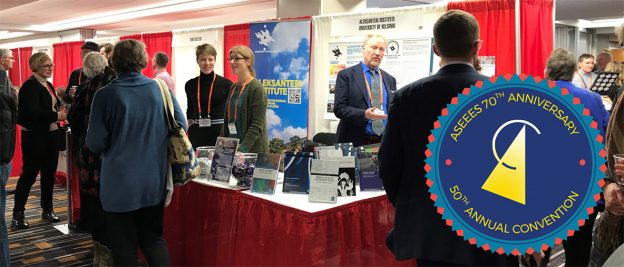by Jussi Lassila
“All in all, Boston was definitely worth visiting this year.”
The annual ASEEES (Association for Slavic, East European & Eurasian Studies) Convention was held this year in Boston on 6–9 December. This was the 50th convention that has been organised while ASEEES celebrated its 70th anniversary. More than 650 panels, roundtables and group meetings on all disciplines related to the field within four days resulted as approximately 45 parallel sessions throughout the convention. Yet, all these events with hundreds of participants found their place almost without notice in the huge Marriot Copley conference hotel in the center of Boston. For an individual participant it was, of course, rather difficult to choose an interesting one from the number of compelling panel descriptions even with a relatively strict thematic focus. I picked up those that discussed Russiaʼs political development, the regimeʼs survival strategies, civil society prospects, political communication and propaganda as well as foreign policy.
In the panel “Survival Strategies of Authoritarian Regimes: The Russian Experience”, Michael Rochlitz from Ludwig-Maximilians University compared the stateʼs anti-corruption campaigns between Russia and China, and pointed out that their function can be largely explained in terms of gaining public legitimacy for the regime. Unsurprisingly, in terms of a more consistent ideological regime and bigger resources, China has succeeded better. Yet, these campaigns cannot be seen unanimously successful in China either. The next panel I chose was titled as “Civil Society and Political Activism in Putinʼs Russia” in which Jan Matti Dollbaum from University of Bremen provided an interesting analysis of protest networksʼ sustainability in light of Russiaʼs “For Fair Elections” -movement. His point was that there are two factors in activists’ choices that shape the chances for sustaining local pro-democratic activism after the end of mass protests: First, the decision for or against early institutionalisation, and second, the design of the decision-making structures of the newly formed organisations.
I was presenter in the panel titled as “Political Opposition, Populism and the Struggle for a Liberal Russia”, and it was organised by Geir Flikke from University of Oslo. Geirʼs own talk provided an extensive history on Navalnyʼs long campaign against Putinism as well as Navalnyʼs role as a juggernaut concerning his efforts in coalition building among the liberal opposition. My own presentation discussed political implications of Navalnyʼs populist inclusion, arguing that Navalnyʼs recent shift from previous exclusive, right-wing populist emphases towards left-leaning, inclusionary populist views, is a result of closing avenues for the oppositionʼs political participation. Our panelʼs third participant, Gulnaz Sharafutdinova from Londonʼs Kingʼs College, who was the first speaker, provided an excellent framework for me and Geir by discussing the role of the 1990s as the negative ‘other’ for the Kremlin and as a pillar of legitimacy for the “Putin majority” which, perhaps, is seemingly facing growing challenges.
It was a pleasure to chair the panel of the Russian Media Lab, titled according to the projectʼs forthcoming volume “Freedom of Expression in Russia’s New Mediasphere”. Despite re-arrangements for presentations due to cancellations, Vera Zverevaʼs (University of Jyväskylä) paper on pro-state messages in Runet offered interesting manifestations and implications regarding the Kremlinʼs attempts of truth relativisation in the situation where the traditional censorship and blocking has become more difficult. Likewise, Vitaly Kazakovʼs and Stephen Hutchingʼs (U of Manchester) provided a thoughtful exploration on Russian-speaking social media users in relation to RT Russian’s news coverage of the contest’s final on Twitter regarding the usersʼ mode of engagement. Marielle Wijermars made excellent notes as a discussant which certainly deepened the impression of sad, yet ultimately fluctuating and uncertain, state of freedom of expression in Russia.
All in all, Boston was definitely worth visiting this year. Most of the conventions panels and roundtables I attended were good – some of them were truly exciting. Aleksanteri instituteʼs presence was notable and was certainly visible in the conventionʼs exhibition hall. Unfortunately freezing weather (it was much colder than in Helsinki!) did not tempt to explore Boston further, although it definitely looks nice and compact along with its record of being one of the oldest cities of the U.S.
